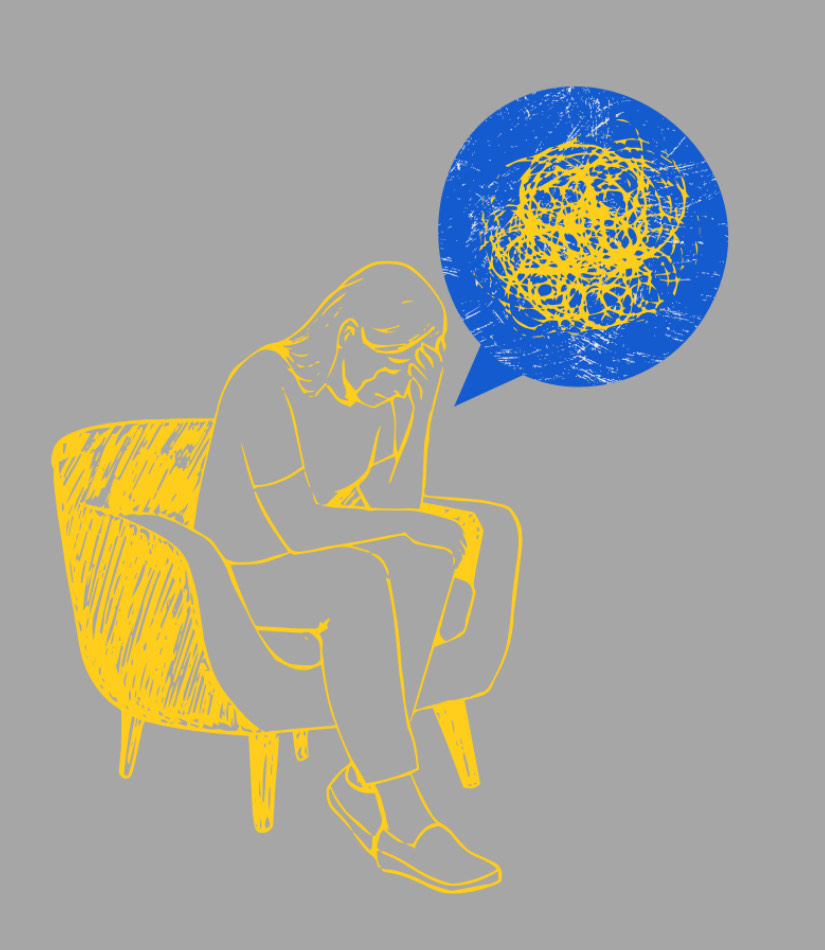What is stress?
Stress and mental health goes hand and hand when discussing illnesses in the body. Stress is a natural response of the body to perceived challenges or threats, often referred to as stressors which lead to long term mental health issues. It triggers a physiological response known as the “fight or flight” response, which prepares the body to react to danger. This response involves the release of hormones like adrenaline and cortisol, leading to physical changes such as increased heart rate, heightened alertness, and energy mobilization. While some stress can be beneficial and motivating, chronic stress can lead to negative physical and most importantly mental health illness.
Stress begins with anxiety. Anxiety is focusing too much on the future which no one has control over. But we do it anyway. We stress about the future as if it’s going to change. Prolonged stress can lead to heightened levels of anxiety, making it difficult for individuals to relax or feel at ease.
As stress persists, it can manifest physically, resulting in health problems such as headaches, digestive issues, and fatigue, which can further complicate mental health. Continuous stress can affect memory, attention, and decision-making abilities, leading to difficulties in day-to-day functioning.
Effects of Stress on the Body
Stress can have a wide range of effects on the body, impacting various systems and overall health. Here are some key effects:
1. Cardiovascular System: Stress can lead to increased heart rate and blood pressure. Over time, this can increase the risk of heart disease, heart attacks, and strokes.
2. Endocrine System: Stress triggers the release of hormones such as cortisol and adrenaline. Chronic elevation of these hormones can disrupt metabolic functions and contribute to weight gain, particularly around the abdomen.
3. Immune System: Chronic stress can weaken the immune response, making the body more susceptible to infections and illnesses. It may also slow down recovery from illnesses.
4. Digestive System: Stress can cause gastrointestinal issues, such as stomach aches, indigestion, diarrhea, or constipation. Conditions like irritable bowel syndrome (IBS) can be exacerbated by stress.
5. Musculoskeletal System: Stress causes the muscles to tense up, leading to headaches, migraines, and musculoskeletal pain, particularly in the neck, shoulders, and back.
6. Nervous System: Chronic stress can affect brain function, leading to difficulties with concentration, memory, and decision-making. It may also contribute to anxiety and depression.
7. Respiratory System: Stress can exacerbate existing respiratory conditions like asthma and lead to rapid breathing or hyperventilation.
8. Reproductive System: In both men and women, stress can disrupt hormonal balance, affecting fertility and sexual function. It may lead to irregular menstrual cycles in women.
9. Skin: Stress can trigger or worsen skin conditions such as eczema, psoriasis, and acne due to increased inflammation and hormonal changes.
10. Sleep Patterns: Stress often leads to sleep disturbances, including insomnia, which can further impact physical and mental health.
Coping with Stress
To cope with ongoing stress, individuals may turn to alcohol or drugs, which can lead to substance use disorders and further exacerbate mental health issues. According to the National Institute of Mental Health, young adults between 18 – 25 have the highest mental health illness rates. Multiple factors are the cause of these increased rates. They include societal pressures, social media, global events, and the fast-paced nature of life.
Chronic stress is a risk factor for developing depression, contributing to feelings of hopelessness and a lack of interest in activities. Chronic stress leads individuals to withdraw from social interactions, resulting in isolation and loneliness, which can worsen mental health. This ultimately leads to suicide which happens to be one of the leading causes of death in the U.S.

Here are some typical Mental Health Illnesses:
1. Anxiety Disorders: These include generalized anxiety disorder, social anxiety disorder, and panic disorder, characterized by excessive worry and fear.
2. Depression: Major depressive disorder and persistent depressive disorder affect mood, leading to feelings of sadness, hopelessness, and a loss of interest in activities.
3. Post-Traumatic Stress Disorder (PTSD): Triggered by traumatic events, PTSD can cause nightmares, flashbacks, and severe anxiety.
4. Obsessive-Compulsive Disorder (OCD): Characterized by intrusive thoughts and compulsive behaviors, OCD can significantly interfere with daily life.
5. Bipolar Disorder: This mood disorder involves extreme emotional highs and lows, which can affect energy, activity levels, and the ability to carry out daily tasks.
6. Eating Disorders: Conditions like anorexia nervosa, bulimia nervosa, and binge-eating disorder are serious issues that affect individuals’ relationship with food and body image.
7. Substance Use Disorders: Many people struggle with addictions, which can co-occur with other mental health issues and complicate treatment.
8. Attention-Deficit/Hyperactivity Disorder (ADHD): This disorder affects concentration and self-control, impacting daily functioning.
9. Personality Disorders: These include borderline personality disorder and narcissistic personality disorder, which can affect interpersonal relationships and self-image.
10. Stress-Related Disorders: Chronic stress can lead to various health issues, including anxiety, depression, and physical health problems.
Awareness, access to help, and destigmatization continue to grow, encouraging more people to seek the support they need.
Here are some common signs of individuals struggling with mental health illness.
Emotional Signs
1. Persistent Sadness: A prolonged feeling of sadness or hopelessness that doesn’t seem to go away.
2. Anxiety: Constant worry, nervousness, or fear, sometimes accompanied by physical symptoms like a racing heart.
3. Mood Swings: Severe fluctuations in mood, including feelings of extreme happiness or anger followed by depression.
Behavioral Signs
4. Withdrawal: Isolating from friends, family, and activities that were previously enjoyable.
5. Changes in Activity Levels: Significant increases or decreases in energy or activity levels, such as lethargy or hyperactivity.
6. Changes in Eating or Sleeping Habits: Noticeable weight loss or gain, changes in appetite, insomnia, or sleeping excessively.
Risky Behaviors
11. Substance Abuse: Increased use of alcohol, drugs, or other substances to cope with emotions.
12. Self-Harm: Engaging in behaviors that intentionally cause harm to oneself.
Social Signs
13. Decline in Performance: A noticeable drop in work or academic performance.
14. Conflict in Relationships: Increased arguments or conflicts with friends, family, or colleagues.
Suicidal Thoughts
15. Talk of Self-Harm or Suicide: Expressing thoughts about wanting to hurt oneself or feeling that life isn’t worth living.
Now that we know what stress does to the body and the different types of mental health illnesses. Several factors can cause a person to stress, and they can be categorized into external and internal factors. It’s important to recognize stressors and develop coping strategies to maintain overall well-being.
Here are the main causes of stress that leads to mental health illness:
External Factors:
1. Work-Related Issues: Job demands, long hours, high expectations, job insecurity, and workplace conflicts can lead to significant stress.
2. Life Changes: Major life events such as moving, marriage, divorce, or the death of a loved one can trigger stress responses.
3. Family Responsibilities: Balancing commitments related to family, such as parenting, caregiving for elderly relatives, or managing family conflicts.
4. Financial Problems: Worries about debt, job loss, and managing expenses can create substantial stress.
5. Health Concerns: Personal health issues or chronic illnesses, as well as concerns about the health of loved ones, can be significant stressors.
6. Environmental Factors: Living in a noisy, crowded, or unsafe environment can contribute to stress levels.
7. Social Pressures: Relationships, social expectations, and peer pressure can create feelings of stress, especially in social or academic settings.
Internal Factors
1. Personality Traits: Certain personality types, such as perfectionists or those with high levels of neuroticism, may experience stress more intensely.
2. Coping Mechanisms: Ineffective coping strategies, such as avoidance or denial, can exacerbate stress levels.
3. Negative Thinking: Pessimism, excessive worrying, and self-criticism are internal factors that can contribute to heightened stress.
4. Expectations and Goals: Setting unrealistic expectations for oneself or striving for unattainable goals can lead to chronic stress.
5. Lack of Control: Feeling powerless in situations or lacking control over one’s circumstances can significantly increase stress.
Understanding these factors can help individuals identify stressors in their lives and implement appropriate strategies to manage and reduce stress.
Now we know what causes stress and mental health illness. Let’s discuss how to manage stress. Studies have shown that relaxation techniques, exercise, healthy eating, and seeking support can help mitigate these negative effects on the body. Managing stress effectively is crucial for maintaining both mental and physical health.

Here are several strategies to help cope with stress to prevent mental health illness:
1. Exercise Regularly: Physical activity releases endorphins, which improve mood and reduce stress. Aim for at least 30 minutes of moderate exercise most days.
2. Practice Mindfulness and Meditation: Techniques such as mindfulness meditation, deep breathing exercises, and yoga can help calm the mind and reduce anxiety.
3. Establish a Routine: Maintaining a consistent daily routine can provide structure and a sense of control, reducing feelings of overwhelm.
4. Prioritize Sleep: Ensure you are getting enough quality sleep by establishing a regular sleep schedule and creating a relaxing bedtime routine.
5. Stay Connected: Building and maintaining strong relationships with friends and family can provide emotional support and reduce feelings of isolation.
6. Set Boundaries: Learn to say no when necessary and prioritize tasks to avoid taking on too much responsibility at once.
7. Limit Caffeine and Alcohol: Reducing intake of stimulants and depressants can help stabilize mood and improve overall well-being.
8. Engage in Hobbies: Dedicate time to activities you enjoy, whether it’s reading, gardening, painting, or playing music, to provide an outlet for relaxation.
9. Practice Time Management: Organizing tasks and breaking them into manageable steps can help reduce feelings of being overwhelmed.
10. Seek Professional Help: If stress becomes unmanageable, consider talking to a mental health professional for guidance and support.
Incorporating these strategies into your daily life can make a significant difference in how you manage stress and improve your overall quality of life. Addressing these issues requires awareness, intentional change, and support to break the cycle and promote healthier patterns.
Take an online screening to see if you are experiencing mental health illness: https://screening.mhanational.org/screening-tools/










